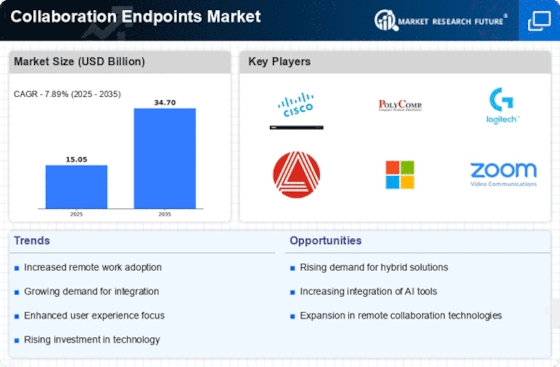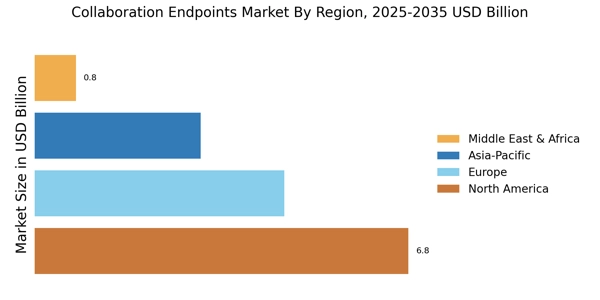Integration of Cloud-Based Solutions
The integration of cloud-based solutions is transforming the Collaboration Endpoints Market. Organizations are increasingly migrating to cloud platforms to leverage the scalability, flexibility, and cost-effectiveness they offer. Cloud-based collaboration tools enable real-time access to information and resources, facilitating seamless communication among teams. Market analysis indicates that the cloud collaboration segment is projected to grow significantly, with estimates suggesting a market size exceeding 20 billion dollars by 2025. This shift towards cloud solutions is indicative of a broader trend where businesses prioritize agility and remote accessibility in their collaboration strategies.
Growing Emphasis on Team Collaboration
The Collaboration Endpoints Market is witnessing a growing emphasis on team collaboration as organizations recognize the value of collective problem-solving and innovation. Companies are increasingly investing in tools that foster collaboration among team members, regardless of their physical location. This trend is supported by research indicating that organizations with strong collaborative cultures are 5 times more likely to be high-performing. As a result, the demand for collaboration endpoints that facilitate teamwork is expected to surge, with market analysts predicting a substantial increase in the adoption of collaborative platforms in the coming years.
Advancements in Communication Technologies
Technological advancements play a pivotal role in shaping the Collaboration Endpoints Market. Innovations in communication technologies, such as high-definition video conferencing and real-time collaboration software, are enhancing user experiences and driving adoption. The integration of features like screen sharing, virtual whiteboards, and instant messaging is becoming standard in collaboration tools. As organizations seek to improve operational efficiency, the demand for sophisticated communication solutions is expected to rise. Market data suggests that the segment of video conferencing solutions alone is anticipated to reach a valuation of over 10 billion dollars by 2026, underscoring the significance of these advancements.
Focus on User Experience and Interface Design
User experience and interface design are becoming critical factors in the Collaboration Endpoints Market. As competition intensifies, companies are prioritizing the development of intuitive and user-friendly interfaces that enhance user engagement. A well-designed interface can significantly impact user adoption rates and overall satisfaction. Market trends indicate that organizations are increasingly seeking collaboration tools that not only meet functional requirements but also provide an enjoyable user experience. This focus on design is likely to drive innovation in the market, as companies strive to differentiate their offerings and attract a broader user base.
Increased Demand for Remote Collaboration Tools
The Collaboration Endpoints Market experiences heightened demand for remote collaboration tools, driven by the ongoing shift towards flexible work arrangements. Organizations are increasingly adopting solutions that facilitate seamless communication and collaboration among distributed teams. According to recent data, the market for collaboration tools is projected to grow at a compound annual growth rate of approximately 12% over the next five years. This growth is indicative of a broader trend where businesses prioritize tools that enhance productivity and connectivity, thereby reinforcing the importance of collaboration endpoints in modern work environments.

















